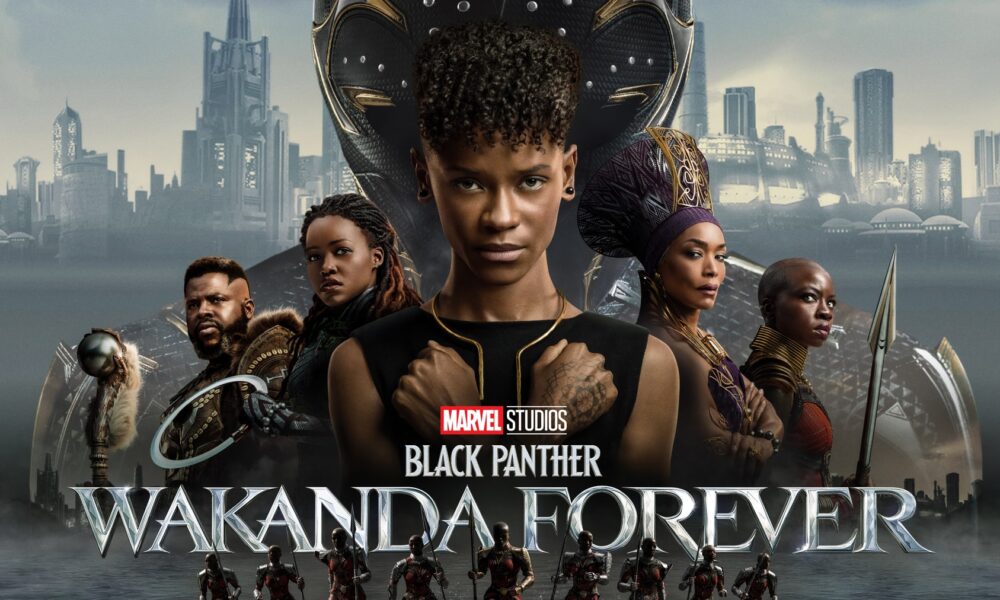Just for Laughs – Simi Ogunsola
After four years of waiting, Black Panther: Wakanda Forever is finally here and people have been talking. Some are calling the film an 11/10 and hailing Ryan Coogler as a genius while others can only describe the film as “mid” and prefer the first movie. Personally, I loved the film, but it was a wild ride for sure. Here is a spoiler-free list of my thoughts while watching.
No wayyy…..
Director Ryan Coogler definitely took audiences for a ride with the cameos and plot twists in this sequel. One second I was flying to the edge of my chair in fear, and the next, shock had me flinging myself back. From multiple conflicts between Wakanda and Talokan going on at the same time, to the frantic omg-the-movie’s-almost-done-but-the-problem-isn’t-resolved stress, the film keeps you engaged and thoroughly entertained.
The U.S. low-key being the bad guy? What’s changed!?
The movie explores tensions between Wakanda and the U.S., among other global superpowers. Without saying too much, it really made me reflect on what makes us consider a country “good” and “bad,” and how narratives (true or otherwise) can be spun to achieve a country’s goals. Poli sci and IDS majors, run, (with an open mind) don’t walk, to this one.
*Speechless*
By “speechless,” I mean that you could’ve heard a pin drop on the stained carpets of theatres worldwide. During the tribute moments, the entire theatre was silent. Fans hoping for a final goodbye to Chadwick Boseman will be pleased by what I can only describe as a love letter to the star. Suffice to say that during the post-credit scene, tears were definitely shed.
Purrrrr Ms. Girllllll!
One thing that wasn’t on my Wakanda Forever bingo card was a touching feminist tale. The film did not shove the “strong Black Woman” trope down audiences’ throats, nor did it obsess over Shuri being a young girl who likes science. The movie simply said: “Here is woman. Here is woman in all of her different facets.” It illustrated, without obsessing over, all the different ways for a woman to just //be// and I really appreciated that.
The film tantalizes the viewer, the soundtrack pleases and surprises the ear, and of course, the actors bring it all home. A must-watch—you won’t regret it.
Cultural Faux Pas – Joy Sebera
Just the Facts
Although opinions may be divided about which Black Panther was better, viewers cannot ignore the sequel’s cinematic merit, aesthetic appeal, intense plot, and moving tribute to the late Chadwick Boseman. However, one of the elements that makes it so popular is the majority Black cast and the film’s inclusion of African cultures. That being said, who is actually being represented and who is the film truly for? The Black Panther superhero was created to introduce a Black superhero, not an African superhero, to the American Marvel comics canon, and the films sustain that narrative.
One Size Fits All
Wakanda is a fictional African country that has closed its borders off from the rest of the world to protect itself from being exploited for vibranium, a fictional resource. The people of Wakanda speak Xhosa, a language from South Africa, and multiple East and West African cultures are represented through the clothing and traditions showcased in the film. Is this positive representation or homogenization that does not take specific African identities seriously? What effect does this serve in a film that does not reflect African realities? Wakanda has never been colonized and the main conflict in the first film is if and how Wakanda should share their resources with a hostile and alienating world. The message is from American voices disguised in African clothing, literally.
Who’s the real villain?
The Black Panther franchise features arguably two of the most sympathetic villains in the Marvel Cinematic Universe —Erik Killmonger and Kukulkan or “Namor.” Without giving too much away, the storyline that pits the Wakandans and the Talokanil against each other is justified, and yet it seems to come completely out of left field. The introduction builds up a plot that would challenge Western exploitation, but it quickly becomes a battle between two nations that both fear exploitation, with Americans at the unsatisfying centre of the resolution. Is it really any surprise that, even in Xhosa, American voices speak the loudest?
Black Panther: Wakanda Forever is currently playing in theatres.








